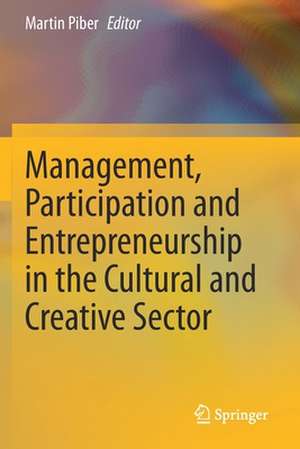Management, Participation and Entrepreneurship in the Cultural and Creative Sector
Editat de Martin Piberen Limba Engleză Paperback – 25 iun 2021
Readers will find critical empirical and theoretical studies that challenge the current understandings of the cultural sector from different theoretical perspectives and with different methodological approaches. A variety of topics are explored within the thematic areas of cultural heritage, managerial practices, participation, and cultural entrepreneurship, as well as their inter-relations. Ultimately the aim is to provide the reader with a better understanding of the sometimes conflicting, sometimes mutually fertilizing areas of the arts, culture, business, management, and innovation. The book will be of interest to scholars, students, professionals, and policymakers.
| Toate formatele și edițiile | Preț | Express |
|---|---|---|
| Paperback (1) | 1105.68 lei 6-8 săpt. | |
| Springer International Publishing – 25 iun 2021 | 1105.68 lei 6-8 săpt. | |
| Hardback (1) | 1111.67 lei 6-8 săpt. | |
| Springer International Publishing – 25 iun 2020 | 1111.67 lei 6-8 săpt. |
Preț: 1105.68 lei
Preț vechi: 1348.39 lei
-18% Nou
Puncte Express: 1659
Preț estimativ în valută:
211.64€ • 229.96$ • 177.89£
211.64€ • 229.96$ • 177.89£
Carte tipărită la comandă
Livrare economică 21 aprilie-05 mai
Preluare comenzi: 021 569.72.76
Specificații
ISBN-13: 9783030467982
ISBN-10: 3030467988
Ilustrații: VI, 240 p. 16 illus.
Dimensiuni: 155 x 235 mm
Greutate: 0.35 kg
Ediția:1st ed. 2020
Editura: Springer International Publishing
Colecția Springer
Locul publicării:Cham, Switzerland
ISBN-10: 3030467988
Ilustrații: VI, 240 p. 16 illus.
Dimensiuni: 155 x 235 mm
Greutate: 0.35 kg
Ediția:1st ed. 2020
Editura: Springer International Publishing
Colecția Springer
Locul publicării:Cham, Switzerland
Cuprins
Management, Participation and Entrepreneurship in the Cultural and Creative Sector: An Introduction.- Part I: Cultural Heritage and Museums.- Financing Museums: Towards Alternative Solutions? Evidence from Italy.- Valuing Universities’ Heritage Assets in Light of the Third Mission of Universities.- Big Data for Decision Making: Are Museums Ready?.- The Effects of Managerial Autonomy on Organizational Culture: The Case of the Archaeological Park of Paestum.- Part II: Cultural Entrepreneurship.- Evaluating Participation and Entrepreneurship in the Cultural and Creative Sector: Experiences From Italy.- The Role of Crowdfunding in Cultural Entrepreneurship: A Business Network perspective.- Part III: Enabling Participation.- The Value of the Relationship Between Architecture and Social Engagement: ImreMakovecz’s Work Within the Faluházak Project.- Culture Invites Participation.An Inquiry on Matera as European Capital of Culture 2019.- Part IV: Evaluation and Learning.- The Evaluationof Organizational Performance: Estonian Cultural and Creative Industries Organizations.- Performance Measurement and Evaluation in the Arts and Cultural Sector: State-of-the-Art in Theory and Practice and Prolegomena for Further Developments.
Notă biografică
Martin Piber is a Professor at the Department of Organisation and Learning and the Scientific Director of the executive MBA-program of the University of Innsbruck (Austria). He teaches at several regular and extended education programs at all study levels in many countries. His work features the relevance of art and culture for society, participatory processes, the practice and theory of management control and performance measurement, the management of cultural organizations, aesthetics and business ethics. His most recent research deals with the impact and the management of European Capitals of Culture as well as inter- and transdisciplinary views on participatory processes.
Textul de pe ultima copertă
This book elucidates and maps the societal impact of experience and heritage, participation, and entrepreneurship in the cultural sector. The contributions address and explore the relevance of culture, cultural entities, and heritage as collective memories and reservoirs of experience for other social systems, change and societal innovators like entrepreneurs. Insofar, cultural activities can be understood as a bridge between past experiences and future challenges. The first key focus is the participation of people in various contexts, initiatives, and projects. Such participation unleashes creativity and connects different societal layers – culture, economy, and innovation. Accordingly, a second focus is the entrepreneurial efforts and ideas that originate within arts and culture.
Readers will find critical empirical and theoretical studies that challenge the current understandings of the cultural sector from different theoretical perspectives and with different methodological approaches. A variety of topics are explored within the thematic areas of cultural heritage, managerial practices, participation, and cultural entrepreneurship, as well as their inter-relations. Ultimately the aim is to provide the reader with a better understanding of the sometimes conflicting, sometimes mutually fertilizing areas of the arts, culture, business, management, and innovation. The book will be of interest to scholars, students, professionals, and policymakers.
Caracteristici
Presents critical studies on the societal impact of knowledge, participation, and entrepreneurship in the cultural sector Explores the relevance of new sources of knowledge supporting creative and cultural organizations and initiatives Addresses the significance of culture, cultural entities, and heritage as collective memories and reservoirs of experience for other social systems and societal innovators
